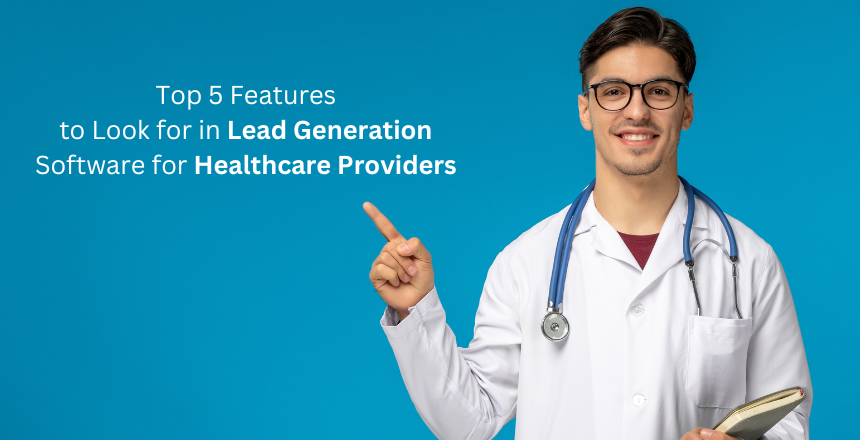
Enquiry Form
Top 5 Features to Look for in Lead Generation Software for Healthcare Providers
In the healthcare sector, patient acquisition and engagement are critical for long-term success. With the right lead generation software, healthcare providers can streamline their marketing efforts, attract the right patients, and ensure a smooth onboarding process. However, not all lead generation tools are built to meet the unique demands of the healthcare industry. When selecting healthcare-focused lead generation software, there are essential features to look for that ensure efficiency, compliance, and improved lead conversion rates.
Here are the top five features healthcare providers should prioritize:
1. Integration with Electronic Health Records (EHR) Software
Why It Matters: Electronic Health Records (EHR) software is at the heart of modern healthcare operations. A lead generation tool integrated with EHR systems can synchronize patient data seamlessly, enabling a personalized approach to patient acquisition.
Benefits:
- Automatically populate patient records with lead data, reducing manual data entry.
- Leverage patient history to create targeted marketing campaigns.
- Ensure continuity between the marketing and care phases of the patient journey.
For example, a practice could use EHR-integrated lead generation software to identify and target individuals at risk for specific health conditions, offering tailored consultations or treatments.
2. HIPAA-Compliant Software Features
Why It Matters: In healthcare, patient privacy and data security are non-negotiable. Lead generation software must comply with the Health Insurance Portability and Accountability Act (HIPAA) to ensure the protection of sensitive patient information.
Benefits:
- Secure storage and transmission of patient data.
- Role-based access controls to restrict unauthorized access.
- Build trust with patients by demonstrating a commitment to privacy and security.
Without HIPAA compliance, healthcare providers risk legal penalties and damage to their reputation, making this feature an absolute necessity.
3. Seamless Functionality with Practice Management Software
Why It Matters: Practice management software is essential for handling administrative tasks like appointment scheduling, billing, and patient communication. When lead generation software integrates with practice management systems, it creates a cohesive workflow that enhances operational efficiency.
Benefits:
- Automatically schedule appointments for new leads.
- Track lead interactions and convert them into active patients.
- Optimize staff time by streamlining administrative processes.
This integration ensures that no potential patient slips through the cracks, improving the overall lead-to-patient conversion rate.
4. Capabilities for Medical Billing Integration
Why It Matters: Medical billing software plays a critical role in financial management for healthcare providers. A lead generation tool that integrates with billing systems ensures a smooth transition from lead acquisition to revenue generation.
Benefits:
- Provide upfront cost estimates or insurance checks to leads.
- Track the financial journey of a patient from lead to treatment.
- Automate invoicing for new patients, reducing manual errors.
By linking lead generation with medical billing software, practices can create a transparent financial process that instils confidence in potential patients.
5. Patient Portal Software Integration for Enhanced Engagement
Why It Matters: Patient portal software empowers individuals to take an active role in their healthcare. Lead generation tools that integrate with patient portals offer a user-friendly way for leads to engage with a practice.
Benefits:
- Allow leads to register and schedule appointments directly through the portal.
- Offer educational content or health tips to keep potential patients engaged.
- Enable two-way communication between providers and prospective patients.
A patient portal streamlines the onboarding process for new leads, turning interest into action with minimal effort.
Why These Features Matter for Healthcare Providers
By incorporating these features, healthcare-focused lead generation software does more than attract patients—it creates a seamless and secure journey from initial interest to ongoing care. These integrations and functionalities not only save time and resources but also improve patient satisfaction and trust.
Conclusion
Choosing the right lead generation software is crucial for healthcare providers looking to grow their patient base while maintaining operational efficiency. Look for tools that integrate with essential systems like EHR software, practice management software, and patient portal software, while ensuring HIPAA compliance for data security. Features like medical billing integration and patient engagement tools further enhance the lead-to-patient conversion process.
With the right solution in place, healthcare providers can focus on what truly matters: delivering exceptional care to their patients.